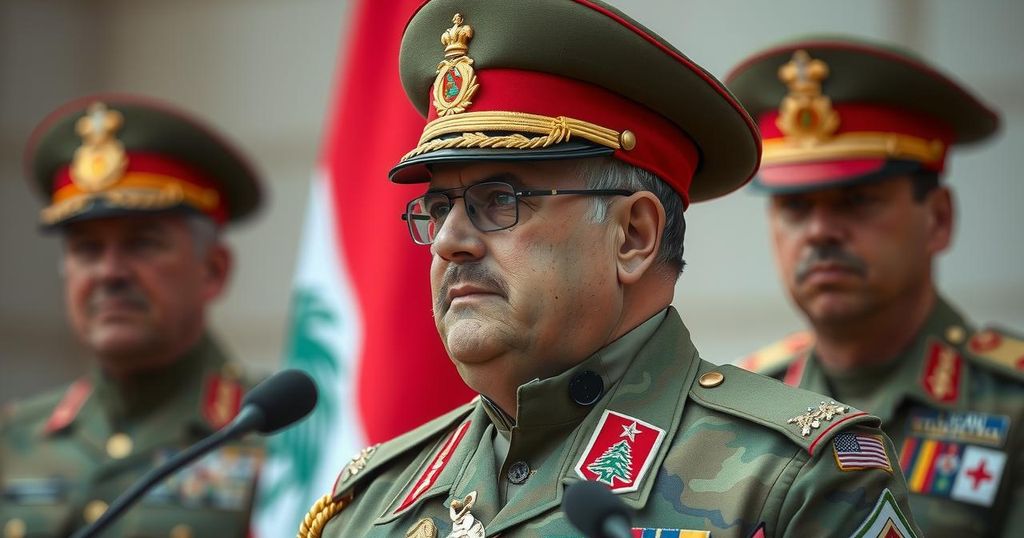Joseph Aoun Elected President of Lebanon Ending Political Stalemate

Joseph Aoun, Lebanon’s army chief, has been elected president after more than two years of political deadlock. His election follows significant support from various political factions and international allies. The presidency, mainly ceremonial, is designated for a Christian under Lebanon’s sectarian framework. Aoun’s leadership is expected to address critical issues, including the ceasefire with Israel and domestic crises, as he assumed office, receiving widespread public celebrations across the country.
Joseph Aoun, the commander of Lebanon’s army, has been elected as the country’s President, signaling the end of a prolonged political impasse that extended for more than two years. His candidacy received support from various political factions, as well as international allies such as the United States, France, and Saudi Arabia, following the withdrawal of a rival candidate backed by Hezbollah. The presidency, although largely ceremonial, is conventionally reserved for a Christian under Lebanon’s sectarian power-sharing arrangement.
The election emerged in the context of a ceasefire agreement between the Lebanese government and Israel, concluded six weeks prior, which played a significant role in reducing Hezbollah’s influence. Under this ceasefire, the Lebanese army is mandated to oversee the withdrawal of Israeli forces while ensuring Hezbollah’s disarmament by January 26th. Joseph Aoun, who has served as the army commander since 2017, has navigated Lebanon through numerous crises, including prolonged conflict with Israel, a severe economic downturn, and the catastrophic Beirut port explosion in 2020, which resulted in over 200 fatalities.
The Lebanese political landscape has been unstable following the last parliamentary elections in May 2022, which left the nation without a fully operational government. Caretaker Prime Minister Najib Mikati struggled to form a new cabinet due to a fractured parliament, which ultimately hindered the election of a new president after multiple votes failed to yield a majority. Although Aoun initially fell short of the required votes in the first round, he was successfully elected in the second round after obtaining 99 votes, reflecting a strong consensus in the parliament that was celebrated widely across the country.
Upon declaring the results, various television outlets displayed jubilant scenes nationwide. Joseph Aoun proceeded to the parliament building in formal attire, where he ceremonially greeted the guards before taking his oath of office. This election is perceived as a crucial moment for Lebanon, as it transitions from a period of stagnation to renewed political leadership under his command.
Lebanon has a complex political structure characterized by a delicate balance among its various sectarian groups. The presidency, a role primarily ceremonial in nature, is traditionally occupied by a Christian leader as part of the country’s sectarian power-sharing system, which aims to ensure representation of diverse communities. The recent years have seen Lebanon facing significant turmoil, including civil strife, economic challenges, and the repercussions of regional conflicts, notably the tensions between Hezbollah and Israel. The political stalemate preceding Aoun’s election exacerbated the country’s issues, ultimately necessitating decisive leadership to address these pressing challenges.
Joseph Aoun’s election as President of Lebanon represents a pivotal moment in the country’s tumultuous political history. After an extended period of deadlock, his presidency is anticipated to enhance stability and facilitate the implementation of the ceasefire agreement with Israel, as well as address ongoing internal crises. With broad political support and international backing, Aoun is positioned to guide Lebanon through its current challenges, although the road ahead remains fraught with complexity.
Original Source: www.bbc.com








